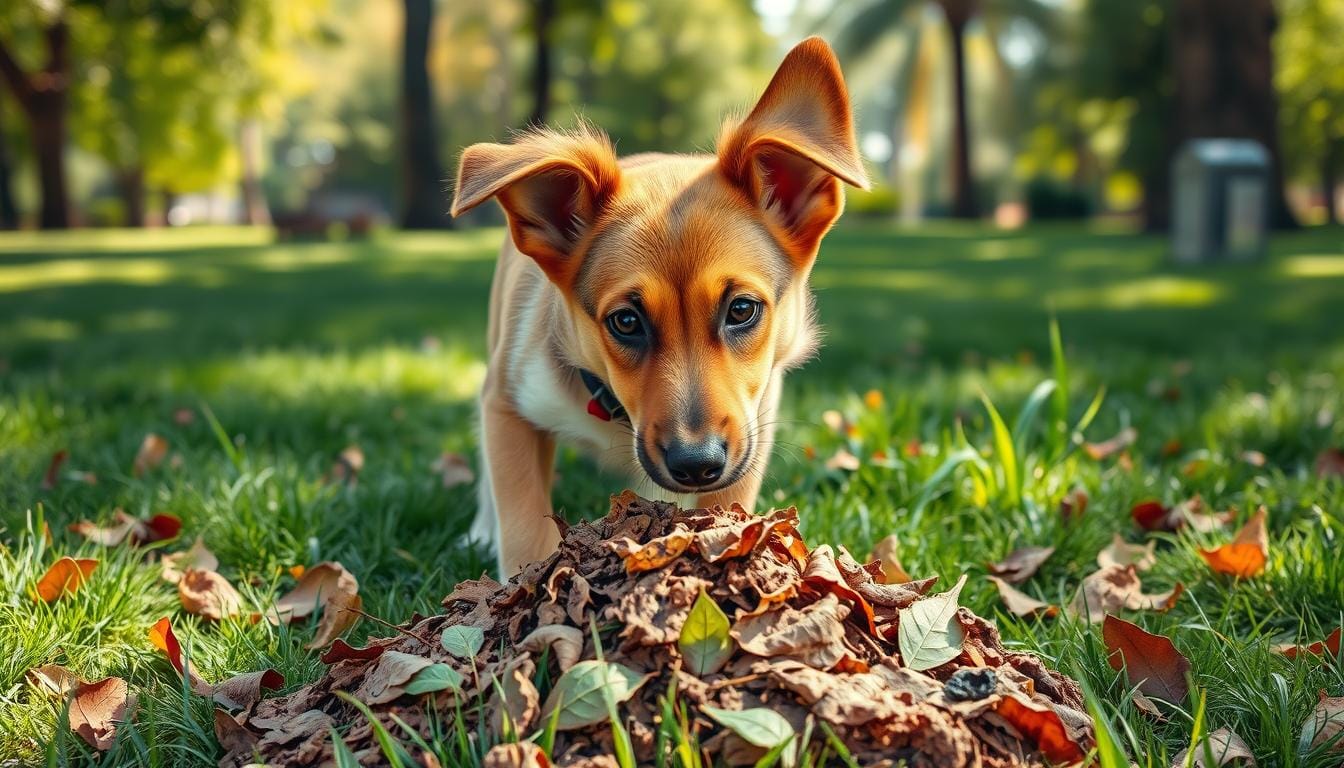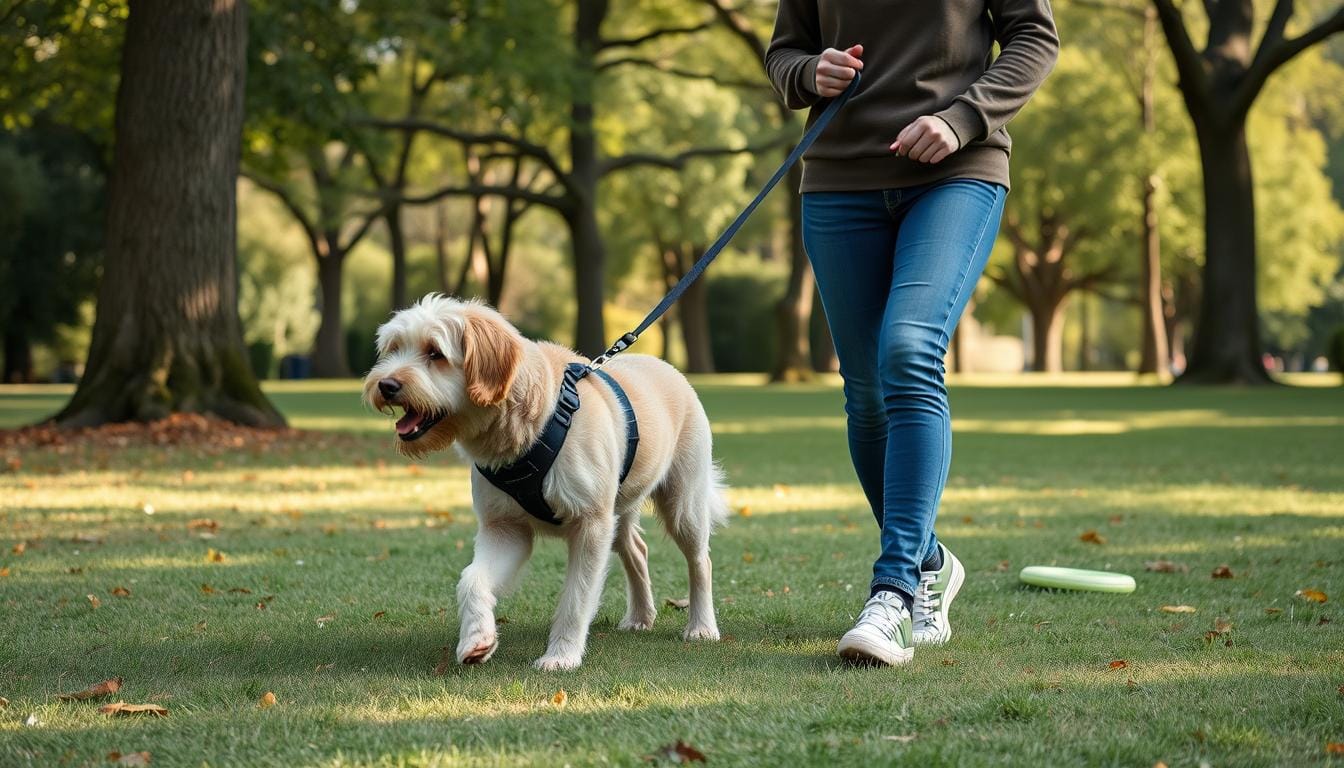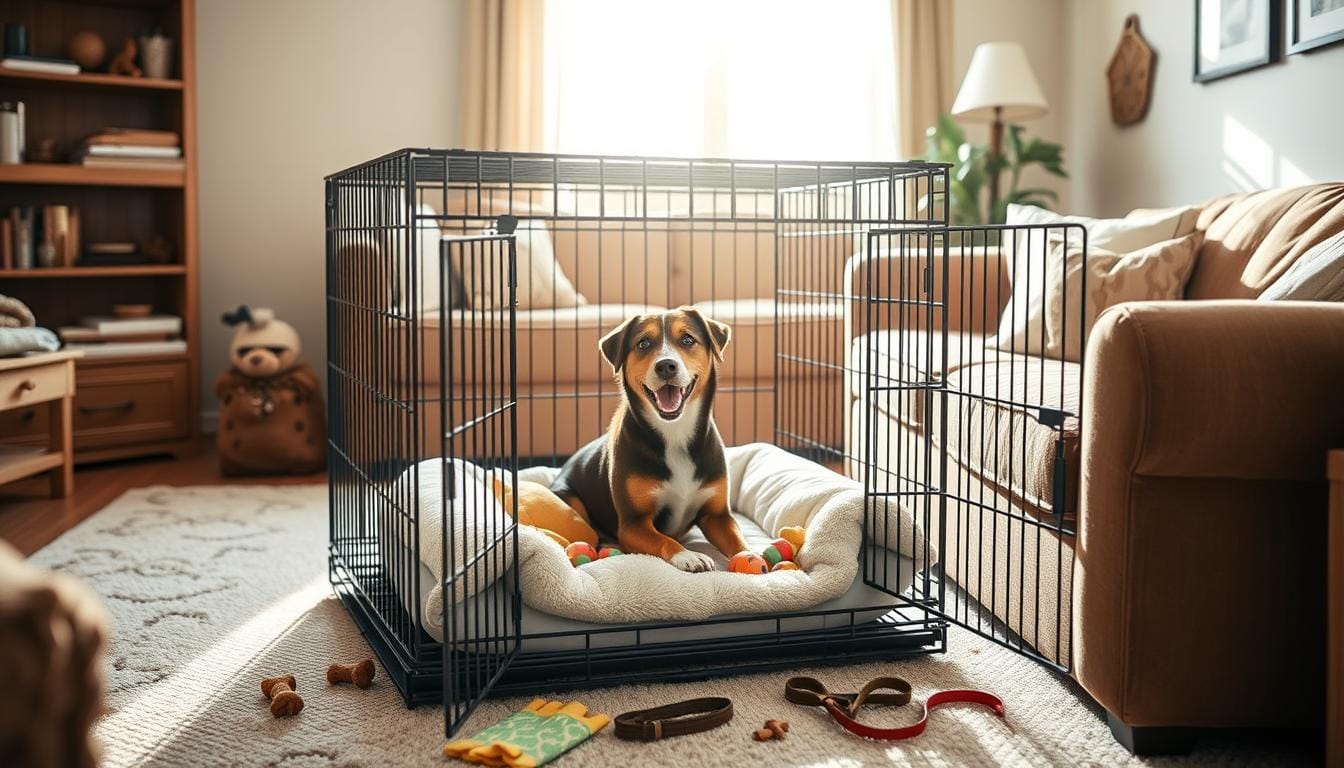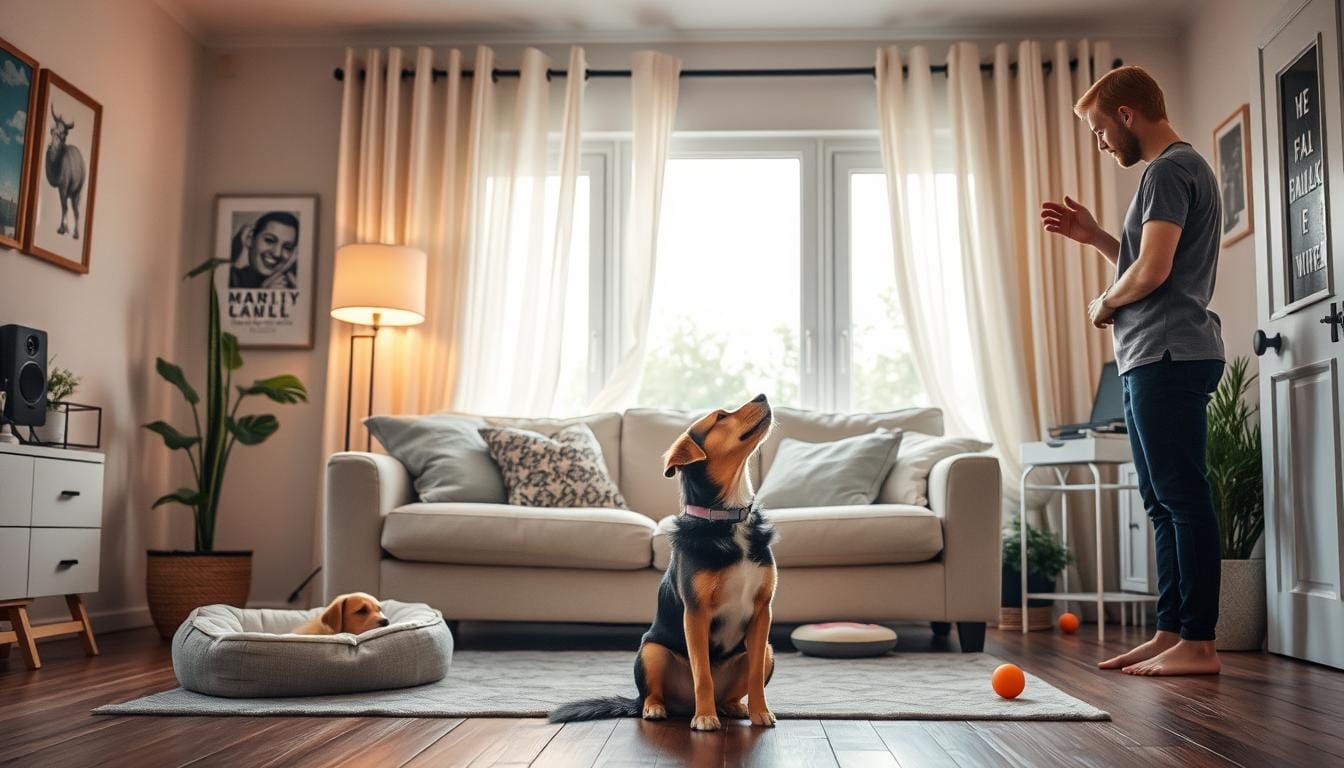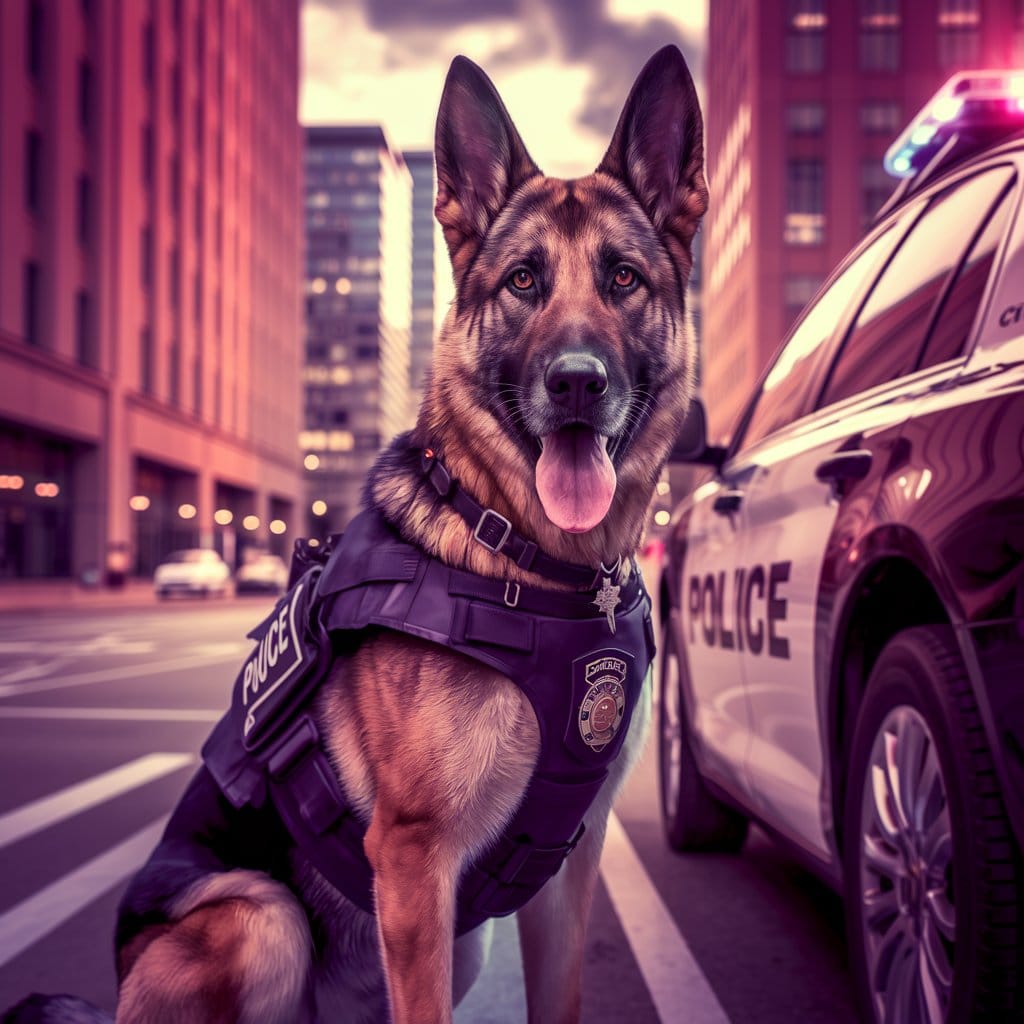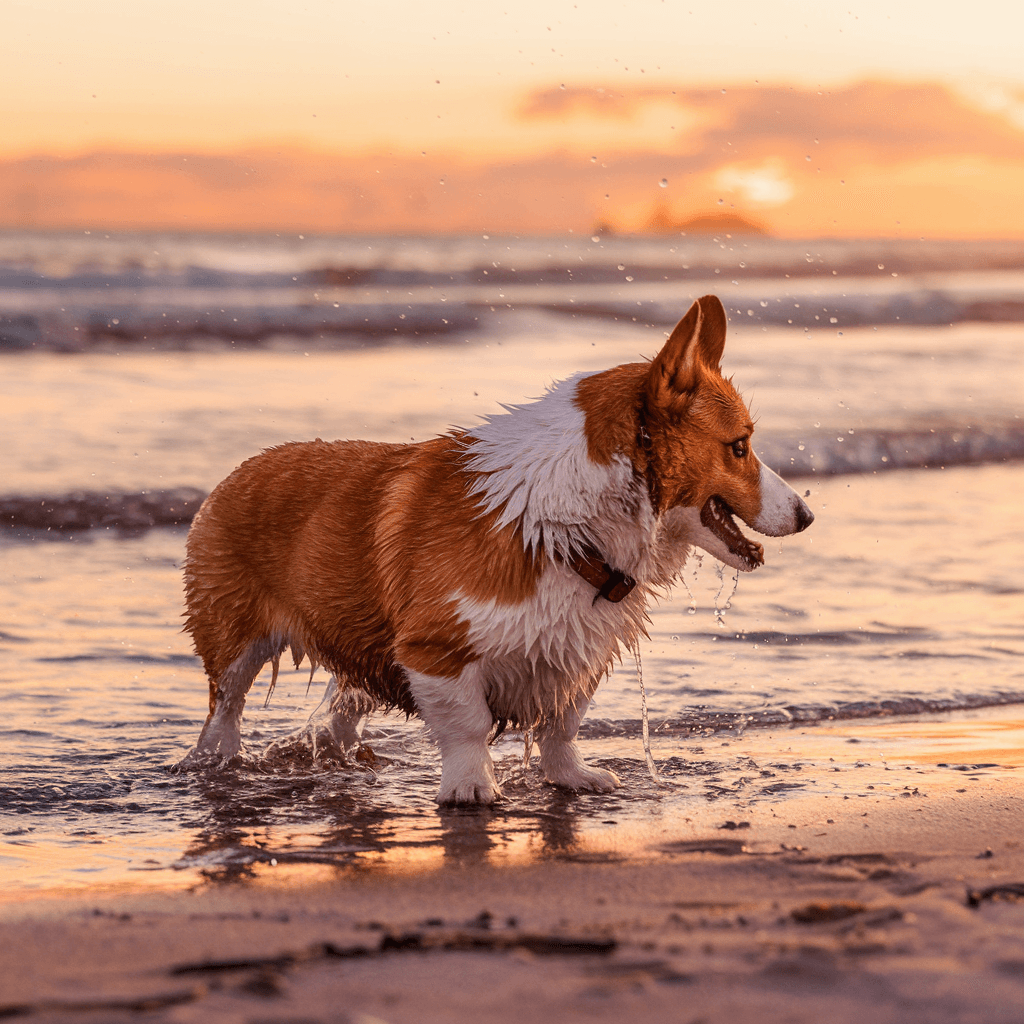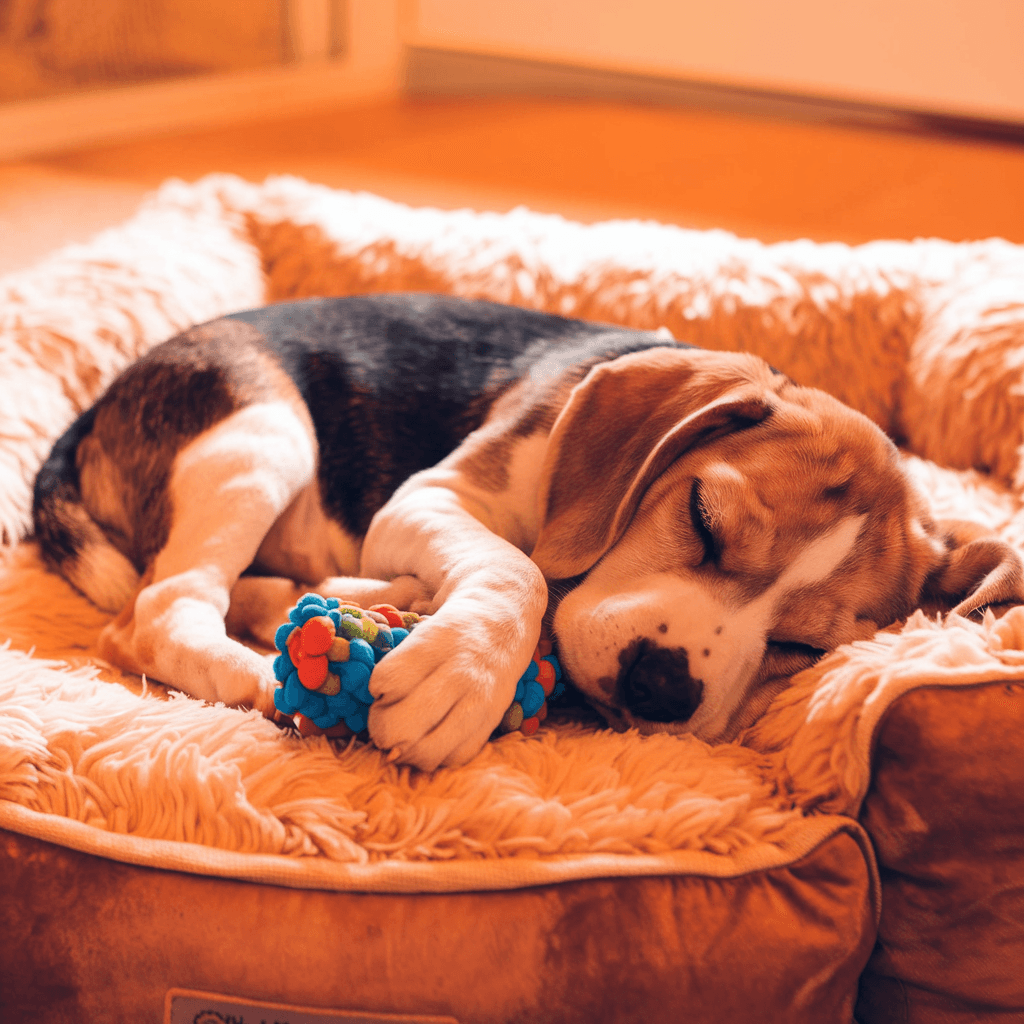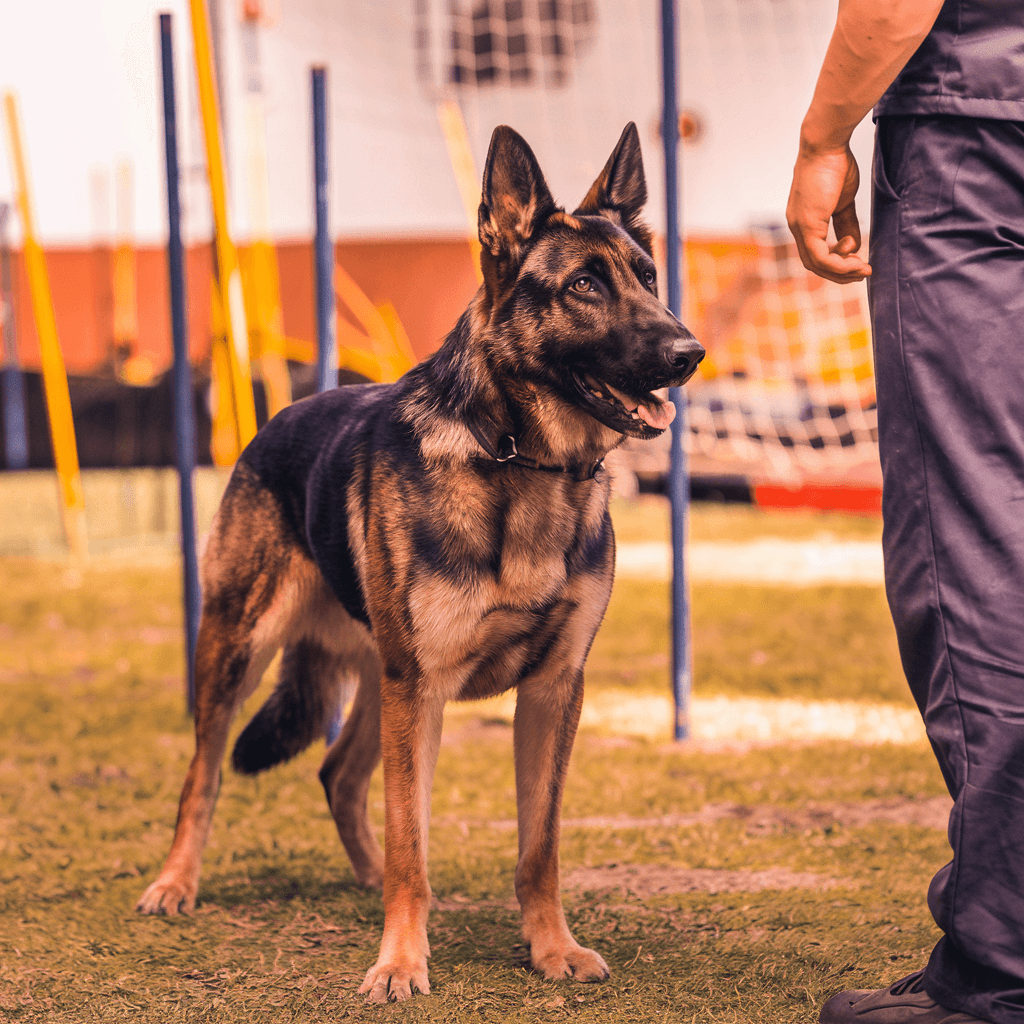Dogs can sense human emotions instinctively. They can read our facial expressions, body language, and voice tone. This emotional intelligence helps them form deep bonds with us. But, what if our furry friends develop habits that puzzle or disgust us?
Coprophagia, or eating poop, is a common behavior in dogs. It’s more common than you might think. Studies show up to 16% of dogs eat poop at some point in their lives.
Understanding why dogs eat poop and how to stop it is key. It’s important for your pet’s health and your peace of mind. In this article, we’ll explore the reasons behind this behavior and offer effective solutions.
Key Takeaways
- Coprophagia is a common behavior in dogs, affecting up to 16% of them
- This habit can stem from various factors, including nutrient deficiencies and behavioral issues
- Mother dogs in the wild eat their puppies’ poop to keep their den clean
- Older dogs may develop this habit due to reduced digestive enzyme efficiency
- Dietary changes, supplements, and behavioral training can help stop this behavior
- Regular cleaning and using deterrents can prevent dogs from accessing feces
- Consult a veterinarian if the behavior persists or if you suspect underlying health issues
Understanding Coprophagia in Dogs
Coprophagia, or poop eating, is a common dog behavior that many pet owners find disturbing. We’ll explore what coprophagia is, how prevalent it is among dogs, and whether it’s normal for puppies to engage in this behavior.
What is coprophagia?
Coprophagia refers to the act of consuming feces. While it may seem gross to us, it’s a natural behavior for many animals, including dogs. This habit can be triggered by various factors, ranging from nutritional deficiencies to behavioral issues.
How common is poop eating in dogs?
Poop eating is more common than you might think. Studies show that 16% of dogs are serious poop eaters, caught in the act at least five times. Additionally, 24% of dogs have been observed eating poop at least once. Interestingly, dogs in multi-dog households are more likely to engage in coprophagia.
| Household Type | Percentage of Dogs Eating Poop |
|---|---|
| Single-dog homes | 20% |
| Multi-dog homes (3 dogs) | 33% |
Is it normal for puppies to eat poop?
Puppy behavior often includes poop eating as part of their exploratory phase. It’s relatively common in young dogs and usually clears up by adulthood with proper nutrition and supervision. Mother dogs naturally eat their puppies’ poop to keep the den clean, which may influence this behavior in puppies.
While coprophagia isn’t typically dangerous for puppies eating their own poop, consuming feces from other animals can lead to health issues if contaminated with parasites or toxins. It’s essential to monitor and discourage this behavior in young dogs to prevent it from becoming a long-term habit.
The Science Behind Why Dogs Eat Poop
Exploring dog behavior shows us why they eat poop. This habit, known as coprophagia, comes from their ancestors. They ate feces to keep their dens clean from parasites. This behavior still exists in dogs today.
Our research finds interesting facts about this odd habit:
- 92% of poop-eating dogs prefer fresh stools, less than two days old
- Puppies are more likely to engage in coprophagia, but it can become a lifelong issue if not addressed
- Dogs with nutritional deficiencies, particularly thiamine (vitamin B1), are prone to this behavior

Understanding why dogs eat poop helps us see their scavenging nature. This trait, developed for survival, leads to less picky eating. It’s a natural part of their instincts, even if it’s not what we want.
| Factor | Influence on Coprophagia |
|---|---|
| Evolutionary history | Protective behavior against parasites |
| Nutritional deficiencies | Increased likelihood of poop eating |
| Age | More common in puppies |
| Stool freshness | Preference for stools less than 2 days old |
Knowing these reasons helps us manage this behavior in dogs. It’s important to be patient and understanding. Remember, it’s a part of their natural instincts.
Common Reasons for Poop Eating in Dogs
Dogs eating poop, known as coprophagia, puzzles many pet owners. We’ll look at why dogs do this, from behavioral issues to health problems and their environment.
Behavioral Causes
Dog behavior is a big reason for coprophagia. Some dogs eat poop because they’re bored or want attention. In homes with more than one dog, this is even more common.
A study showed 33% of dogs in homes with three dogs eat poop, compared to 20% in single-dog homes. Puppies might pick up this habit from their mothers during grooming.
Medical Causes
Health issues can also make dogs eat poop. These include not getting enough nutrients, digestive problems, and parasites. Dogs with diabetes or thyroid issues might eat feces too.
Environmental Factors
Where a dog lives can also affect their poop eating. Stress from being punished during house training or living in small spaces can make them eat poop. Dogs in homes with elderly or sick dogs are more likely to do this.
Having easy access to where dogs go to the bathroom also makes them more likely to eat poop.
“Understanding the root cause of coprophagia is key to addressing this behavior effectively in our canine companions.”
By knowing why dogs eat poop, we can find ways to stop it. This helps keep our furry friends healthy and happy.
Health Risks Associated with Coprophagia
Coprophagia, or poop eating, can be harmful to dogs. While it might not always make them sick, eating waste from other animals can cause health problems. Let’s look at the dangers of this behavior.
Parasites are a big worry with coprophagia. Dogs can get intestinal worms and other harmful organisms from contaminated feces. This can cause digestive issues, weight loss, and poor health.
Bacterial infections are also a risk. Feces often have harmful bacteria that can upset a dog’s stomach. Symptoms include vomiting, diarrhea, and feeling tired. In bad cases, these infections can cause serious health problems.
| Health Risk | Symptoms | Potential Consequences |
|---|---|---|
| Parasitic Infections | Weight loss, diarrhea, vomiting | Intestinal damage, malnutrition |
| Bacterial Infections | Gastrointestinal distress, fever | Dehydration, organ damage |
| Toxin Exposure | Lethargy, loss of appetite | Liver damage, neurological issues |
Toxin exposure is another worry. If a dog eats feces from an animal that has eaten harmful substances, it can get poisoned. This risk is high when dogs eat waste from animals treated with medicines or pesticides.
To keep your dog healthy, stop coprophagia and get vet help if it keeps happening. Regular vet visits and treating health problems quickly can help avoid these risks. This way, your dog can stay healthy and happy.
How to Stop Dog From Eating Poop
To stop your dog from eating poop, you need a few key steps. We’ll look at ways to prevent poop eating and change your dog’s behavior.
Environmental Management
Make sure your dog’s area is clean by quickly picking up feces. Always watch them closely during walks to keep them away from poop. This is a big part of training and preventing poop eating.
Behavioral Training Techniques
Here are some training methods to stop poop eating:
- Teach “leave it” command
- Practice “come” command
- Reward good behavior with treats
- Redirect attention when approaching feces
Dietary Changes and Supplements
Changing your dog’s diet can help a lot:
| Supplement | Effectiveness | Benefit |
|---|---|---|
| Apple Cider Vinegar | 31% success rate | Alters stool taste |
| Digestive Enzymes | 25% improvement in older dogs | Aids nutrient absorption |
| Pineapple Snacks | 90% success rate | Changes stool flavor |
| Canned Pumpkin | Highly beneficial | Improves digestion |
Always talk to your vet before adding new supplements. Good dog food is key for your dog’s health and can help stop poop eating. With these steps and consistent training, you can help your dog avoid this bad habit.
Preventive Measures for Poop Eating
Poop eating prevention starts with effective environmental management and dog training. We can take several steps to discourage this behavior and keep our furry friends healthy.

Firstly, maintaining a clean yard is crucial. Pick up after your dog immediately to remove temptation. During walks, keep your dog on a leash and supervise closely. This allows you to redirect their attention if they show interest in feces.
Training plays a key role in prevention. Teach your dog a solid “leave it” command. Use positive reinforcement to reward your dog for ignoring feces. Offer a treat or praise when they finish their business without showing interest in eating it.
- Keep litter boxes clean and out of reach
- Provide mental and physical stimulation
- Ensure a balanced diet with necessary vitamins
- Address any underlying anxiety or stress
For multi-pet households, manage access to cat litter boxes. Consider using covered or self-cleaning boxes to limit your dog’s access. Regular exercise and engaging activities can prevent boredom-induced poop eating.
Dietary changes can also help. Some owners report success with adding pineapple, pumpkin, or spinach to their dog’s food. These foods may make feces less appealing. Always consult your vet before making significant dietary changes.
By combining these preventive measures with consistent training, we can effectively reduce the likelihood of our dogs engaging in this unpleasant habit.
Products and Deterrents to Discourage Poop Eating
Dogs eating poop can be frustrating. But, there are many ways to stop this behavior. We’ll look at some effective solutions to keep your dog from eating poop.
Taste-Aversion Products
Taste-aversion products make poop unappealing to dogs. These dog supplements include ingredients like monosodium glutamate and chamomile. Some popular options are:
- NaturVet Coprophagia Stool Eating Deterrent Soft Chews
- Healthy Solutions No Stool Eating formula
- Zesty Paws Chew No Poo Bites
Enzyme Supplements
Enzyme supplements help with digestion and might reduce poop eating. They often have papain to break down proteins. Bernies Perfect Poop Digestion Supplement is a 4-in-1 formula for dogs’ digestive issues.
Vitamin Supplements
Vitamin B supplements can help with nutritional deficiencies that lead to poop eating. For-bid Stool Eating & Coprophagia Deterrent has been vet-recommended for over 60 years. Solid Gold No Stool Eating Supplement is America’s first holistic pet food, offering a unique solution.
While these products can work, it’s key to find the cause of poop eating. If it doesn’t stop, talk to your vet to check for health issues.
When to Seek Veterinary Help
If your dog keeps eating poop, it might mean there’s a health problem. If your dog still eats poop even after you try to stop it, see a vet. Getting your dog checked by a vet is key to keeping them healthy and finding out why they eat poop.
Vets can do detailed checks to find out if there’s a serious issue. They might do blood tests or check your dog’s poop for parasites or other problems. These issues can make your dog eat poop and need to be fixed right away.
Look for these signs to know when to get help:
- Your dog eats poop a lot or can’t stop
- They also lose weight or have diarrhea
- They eat less or more than usual
- You see whole food in their poop
About 25% of dogs eat poop at some point. It might seem normal, but it can harm your dog. A vet can give advice and treatment to fix the problem.
If your dog’s behavior is mainly about eating poop, your vet might send you to a dog behaviorist. These experts can help change your dog’s behavior and stop them from eating poop.
Don’t wait to get help. Getting help early can keep your dog safe and happy.
Conclusion
We’ve looked into coprophagia in dogs, a common issue for many pet owners. It’s important to understand why dogs do this. About 10% of dogs eat their own poop, and 85% eat poop from others.
There are many ways to stop dogs from eating poop. We’ve talked about keeping yards clean and using products that taste bad. Teaching dogs to drop things they shouldn’t eat is also helpful.
Changing this habit takes time and effort. If your dog still eats poop after trying these methods, see a vet. They can check for health problems that might cause this behavior. With patience and the right help, we can help our dogs stop this habit and stay healthy.

